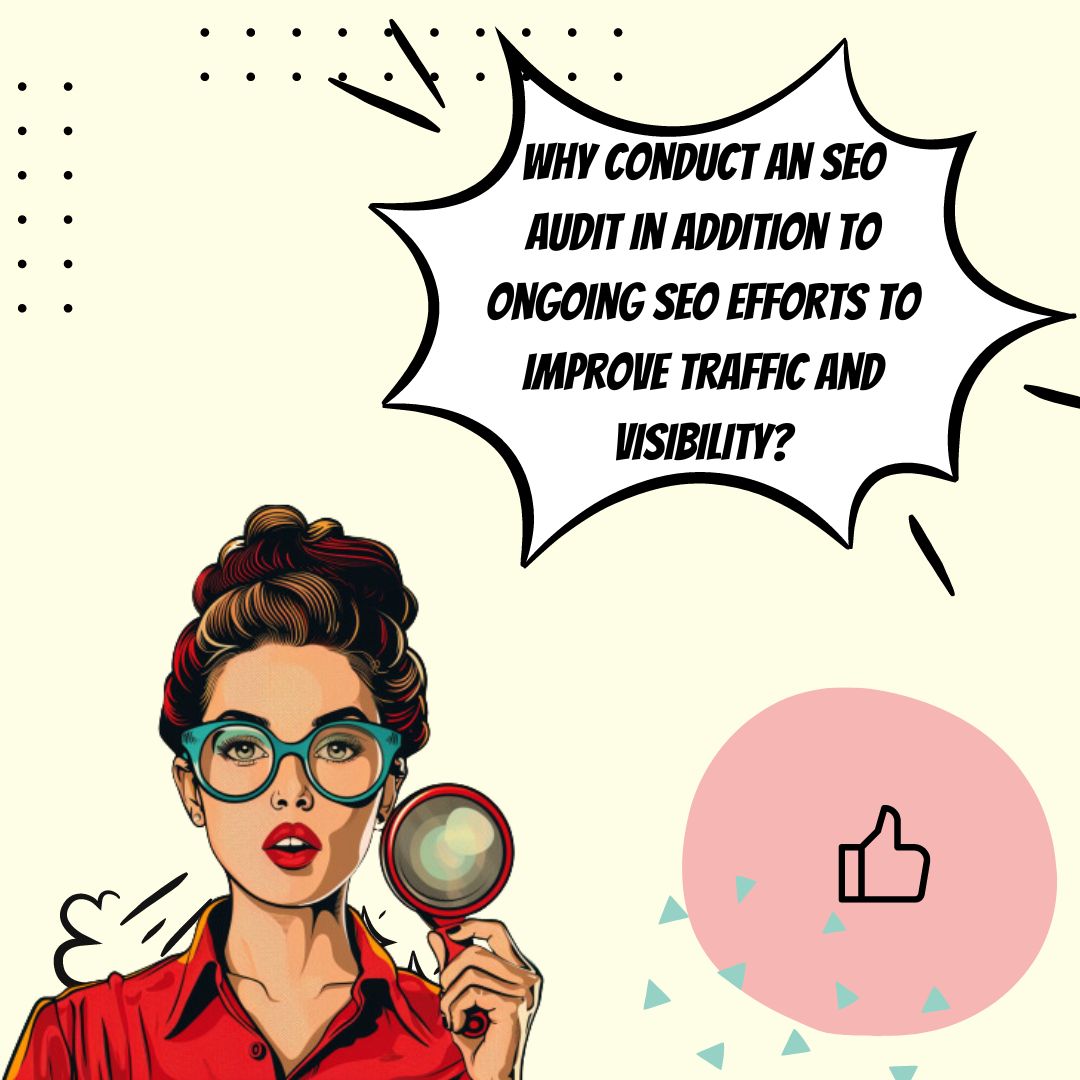Key Takeaways
✅ SEO vs. SEO Audit: Big Picture vs. Deep Dive: SEO is the ongoing process of optimizing your website for search engines. An SEO audit is a comprehensive analysis that identifies specific areas for improvement within your overall SEO strategy. Think of SEO as general fitness and an SEO audit as a detailed checkup.
✅ Focus: Rankings vs. Actionable Insights: SEO aims to improve your website's ranking in search results for relevant keywords. An SEO audit provides actionable recommendations to address technical issues, enhance content, and build backlinks, ultimately leading to better rankings.
✅ Long-Term Strategy vs. One-Time Evaluation: SEO is a continuous process that requires ongoing effort and adjustments. An SEO audit is typically conducted periodically (e.g., quarterly, yearly) to monitor progress and identify new areas for optimization within your SEO strategy.

Introduction
Are you harnessing the full power of your website to attract visitors and climb to the top of search engine rankings? While SEO and SEO audits are both vital tools in the digital marketer's toolbox, understanding their unique roles and benefits is essential for driving traffic and improving visibility. But what really separates these two strategies? And how can pinpointing their differences give you the edge in a competitive online landscape?
Whether you're looking to fine-tune your SEO game or are curious about the transformative effects of a comprehensive site audit, you're not alone. With the online sphere more crowded than ever, it's clear that strategic, informed approaches are no longer optional—they're imperative for success. This article will demystify these concepts, armed with modern insights and industry practices that can potentially skyrocket your website's performance.
Stay tuned as we unravel the intricacies of SEO and SEO audits—with actionable insights to not only understand but also implement strategic improvements. Get ready to dive into a world where data meets decision-making, and where your website's untapped potential is just an audit away.

Top Statistics
| Statistic | Insight |
|---|---|
| 68% of online experiences begin with a search engine | This highlights the immense role search engines play in internet navigation and why SEO is essential for being the starting point of a user's online journey. |
| SEO drives 1,000%+ more traffic than organic social media | Boldly states the effectiveness of SEO over social media in generating website visits, emphasizing the importance of maintaining a strong SEO strategy. |
| 92.96% of global traffic comes from Google Search, Google Images, and Google Maps | Sheds light on the dominance of Google in online searches and the necessity of optimizing for Google's platforms. |
| SEO leads have a 14.6% close rate, while outbound leads (such as direct mail or print advertising) have a 1.7% close cooling rate | Highlights the higher efficiency of SEO as a marketing strategy in terms of converting leads into customers compared to traditional methods. |
| The average top-ranking result has a CTR of 9.28%, followed by 5.82 and 3.11% for positions two and three | Emphasizes the steep drop-off in click-through rates after the first result, underlining the importance of ranking as high as possible, which is a key focus of SEO audits. |
What is SEO?
Search engine optimization, better known as SEO, is all about making your website a star on search engines like Google. Imagine you have a store in a huge mall; SEO is the difference between being tucked away in a corner and being right in the front where everyone walks by. The main goals? Get more people to visit your site without paying for ads, create a great experience for your visitors, and make sure you pop up high when people are looking for what you offer.

What is an SEO File?
Think of an SEO audit as a health check-up for your website. It's like a doctor looking over every part of your site to figure out what's working well and what needs a bit more care. This isn't just a surface-level glance – it's a deep dive into everything from how fast your pages load to how your content talks to your visitors. The aim is to find those little (or big) problems that are stopping your website from being the best it can be.
Key Differences Between SEO and SEO Audit
When we talk about SEO analysis versus an SEO audit, we're looking at a snapshot compared to the whole album. An analysis might just zoom in on where your website stands today in search ranks, while an audit goes the whole nine yards, reviewing everything that influences your online presence. And then there's the flip side – technical SEO audits check the nuts and bolts of your website, making sure everything under the hood is running smoothly, while content SEO audits are all about the stories you tell and the words you're using.
Benefits of Conducting an SEO Audit
An SEO audit can be a real eye-opener. It's like having a business consultant point out exactly where you're losing customers and how you can fix it. You might find technical glitches you didn't know existed or realize that your content isn't as helpful to your audience as it could be. Spotting these issues is gold because fixing them can not only boost your spot in search rankings but can actually make people stick around on your site longer and trust you more.
Tools and Methods for Conducting an SEO Audit
To really know what's happening with your site, you'll want to have some SEO tools in your belt. Google Analytics is like the GPS for your site, while Google Search Console tells you exactly how search-friendly your site is. Looking for more? Dive in with Screaming Frog to sniff out the nitty-gritty details, or pull out the magnifying glass with Ahrefs, SEMrush, or Moz to see how you stack up against the competition. Your best bet is not to rely on just one – mix and match to get the full picture.
Implementing SEO Audit Recommendations
Once you've got the audit results, it's time to roll up your sleeves. Making technical improvements could mean speeding up your load times or making sure search engines can crawl through your site without stumbling. But don't stop there; look at your content and strategic enhancements. That might mean rethinking what you write about or how you connect with people on social media. Stay vigilant, keep an eye on your progress with ongoing monitoring, and be ready to tweak things as you go along. After all, the online world never stands still, and your SEO strategies shouldn't either.
AI Marketing Engineers Recommendation
Recommendation 1: Invest in Regular SEO Audits to Stay Ahead: Staying current in the volatile world of search engine optimization is no small feat. A common mistake some businesses make is treating SEO as a one-time setup, but it’s a continual process. Data from Search Engine Journal suggests that websites that conduct regular SEO audits – at least every quarter – see an uptick in organic traffic by up to 15%. By performing SEO audits consistently, you can identify and fix issues before they affect your rankings, and adjust your strategies to match the changing algorithms and market trends.
Recommendation 2: Integrate User Experience (UX) into Your SEO Strategy: Google's algorithm updates increasingly prioritize user experience. This includes website loading speed, mobile-friendliness, and how easily users can find and interact with content. According to a study by Adobe, 38% of people will stop engaging with a website if the content or layout is unattractive. Thus, enhancing UX is not just about aesthetics but is crucial for SEO. Keep tabs on the user experience elements of your website through SEO audits and continuously improve them to ensure they complement your SEO efforts and boost site visibility.
Recommendation 3: Adopt Comprehensive SEO Tools for Precise Analysis and Reporting: Tools like Ahrefs, SEMrush, or Moz offer advanced features that not only aid in-depth SEO audits but also help in crafting strategies based on competitive insights and keyword research. For instance, SEMrush reports that their users have experienced an average of 80% more organic traffic after using their site audit and position tracking tools. These tools provide essential data like backlink quality, content analysis, and keyword positioning that are fundamental for improving your website's SEO performance. Regular audits with these tools can help you effectively pinpoint strengths to capitalize on and weaknesses to address, giving you an edge in the digital marketplace.

Relevant Links
- Revolutionize Your Marketing with Advanced AI Technology
- Master Advanced SEO Techniques for Baidu
- Utilizing Analytics to Understand Consumer Journeys in China
- Learn the Key Performance Metrics for PPC Success in China
- Strategies for Powering Up Your Marketing Efforts in India
Conclusion
Understanding the difference between SEO and an SEO audit is crucial for any website owner aiming to improve their online visibility. It's clear that SEO is the ongoing process that keeps your site visible and appealing to search engines—a never-ending commitment to staying relevant and accessible. On the other hand, an SEO audit is like a health check for your website, taking stock of all the elements that contribute to your online presence and ensuring they're working together smoothly.
But why bother with an audit? The benefits are substantial. Through a thorough evaluation, we identify technical mishaps, content inadequacies, and user experience barriers, all of which could be hindering your website's performance without you even realizing. More so, conducting an SEO audit shines a light on hidden opportunities—like untapped keywords or content gaps—positioning you a step ahead of the competition.
Equipped with tools such as Google Analytics, SEMrush, and Ahrefs, even the most intricate parts of your website's SEO become actionable insights. By implementing SEO audit recommendations, you can rectify pressing issues and bolster both your technical setup and content strategy. It's not a one-off task, though. Ongoing monitoring and adjustment are paramount; SEO is an ever-changing landscape, and staying agile is key to sustained success.
Reflect on your current strategy: When was the last time your website underwent a comprehensive SEO audit? If it's been a while, you might be operating with blinders on. Remember, an audit isn't just a report card—it's a roadmap to improving visibility and rankings, essential for drawing in that organic traffic which is so vital to your online prosperity.
In essence, both SEO and SEO audits serve as pillars supporting your website's potential to attract visitors and convert leads. Whether you're just starting out or looking to fine-tune your online strategy, grasping these concepts is invaluable. Dive into an SEO audit with a clear strategy and skilled team, and watch your digital footprint expand. It's an investment in your site's health and, ultimately, your business's growth.

FAQs
Question 1: What is SEO?
Answer: SEO, or Search Engine Optimization, is all about making your site more visible when people search for things online. Think of it like putting your best foot forward so that search engines like Google can find your website easily and show it to more people.
Question 2: What is an SEO Audit?
Answer: Imagine giving your website a health check-up. That's what an SEO audit is. It's a way to scout for anything that might be messing with your site's ability to show up on search engine results. We're talking about checking things like how fast your site loads, if it's easy for search engines to understand, and if it's actually giving users what they're looking for.
Question 3: What is the purpose of an SEO Audit?
Answer: The main goal is to find the snags and snarls that are keeping your website from being seen. It’s like finding the pieces of a puzzle that don't fit and fixing them so your website can rank better and attract more visitors.
Question 4: What are the key differences between a Technical SEO Audit and a Content SEO Audit?
Answer: Think of a technical SEO audit as looking under the hood of a car – it's all about the mechanics of your website. On the other hand, a content SEO audit is about the conversations you're having with your guests – the words, the messages, and the value you're providing.
Question 5: How does an SEO Audit differ from an SEO Analysis?
Answer: While an audit is a thorough examination, kind of like a deep clean of your entire website's SEO health, an analysis is more like regular housekeeping. It zeroes in on specific areas and checks how things are going on a more regular basis.
Question 6: What tools are commonly used for conducting an SEO Audit?
Answer: There's a toolbox that SEO pros dip into, with favorites like Google Analytics for insights on traffic, Google Search Console for how your site appears in search, and other nifty gadgets like Screaming Frog, Ahrefs, SEMrush, and Moz that help diagnose and track your website's SEO status.
Question 7: How often should an SEO Audit be conducted?
Answer: Think of it as a routine check-up. It's wise to do an SEO audit once or twice a year to keep your site in tip-top shape and adapt to the ever-changing rules of search engines.
Question 8: What are the key components of an SEO Audit report?
Answer: In an SEO audit report, you'll see a breakdown of your website's technical setup, the content you’ve got, and how you're doing away from your own site, like backlinks. Plus, it'll outline steps for boosting your search performance.
Question 9: What are the benefits of conducting regular SEO Audits?
Answer: By doing regular SEO audits, you can help your site climb the search engine ladder, get more eyes on your content, provide a better experience for your visitors, and stay ahead of the curve against your online rivals.
Question 10: How can an SEO Audit help in improving website performance?
Answer: By shining a light on the nooks and crannies that need work, an SEO audit can guide you toward a smoother, more satisfying website that not only draws in more visitors but could also convert more of them into customers.

Academic References
- Chaffey, D., & Ellis-Chadwick, F. (2019). Digital Marketing (7th ed.). Pearson Education Limited. This comprehensive textbook outlines the complexities of digital marketing, including a chapter that delineates the distinction between SEO strategies and the necessity of conducting regular SEO audits for maintaining website health and improving online visibility.
- Levy, M., & Powell, P. (2017). Strategies for Growth in SMEs: The Role of Information and Information Systems. Information Systems. Elsevier. This book offers insights into how SMEs can use information systems for growth, with one section discussing the role of regular SEO audits in refining a website's content and technical structure to better serve the needs of its target audience.
- Kumar, V., & Petersen, A. S. (2015). Using a customer-level marketing strategy to enhance firm performance: A review of theoretical and empirical evidence. Journal of the Academy of Marketing Science, 43(4), 504-529. The authors review strategies for enhancing a firm's marketing initiatives, touching upon the importance of SEO and periodic audits in aligning a website’s content and structure with evolving market trends and consumer behaviors.
- Beel, J., & Gipp, B. (2009). Google Scholar’s Ranking Algorithm: An Introductory Overview. In Proceedings of the 12th International Conference on Scientometrics and Informetrics (Vol. 1, pp. 230-241). This article breaks down the complexity of search engine algorithms and by extension highlights the importance of SEO analysis and audits in understanding how to optimize websites for higher visibility in search engine rankings.







